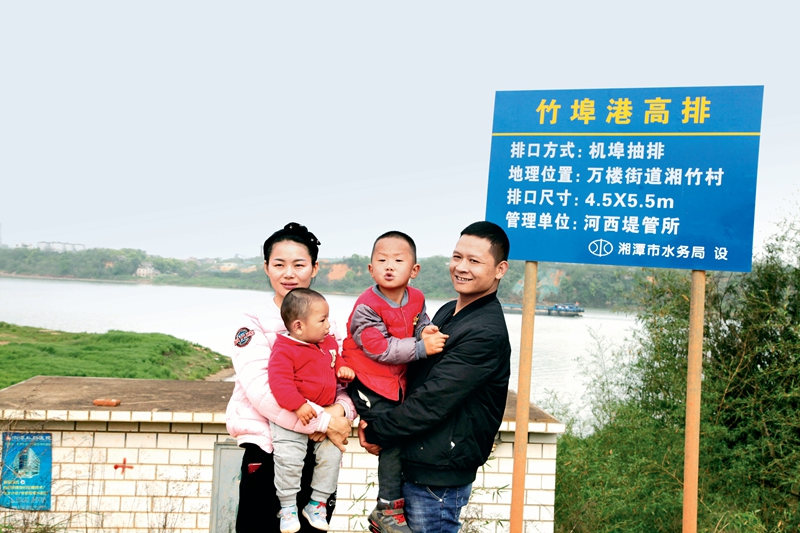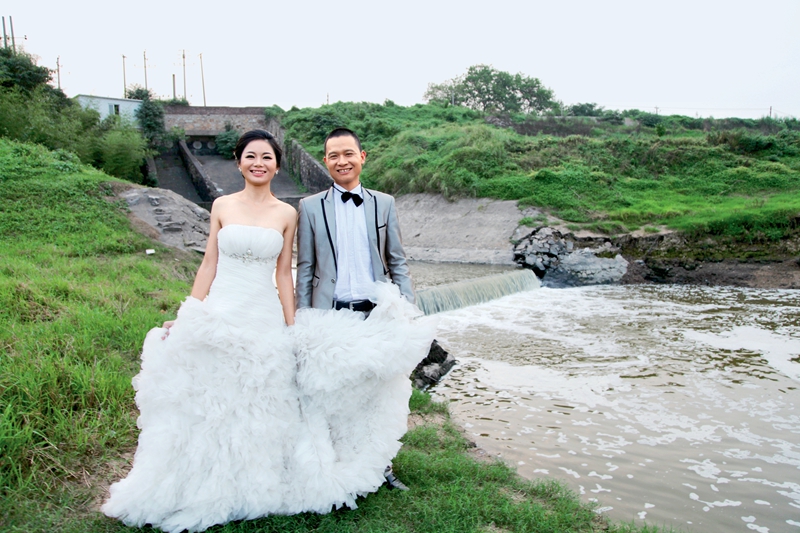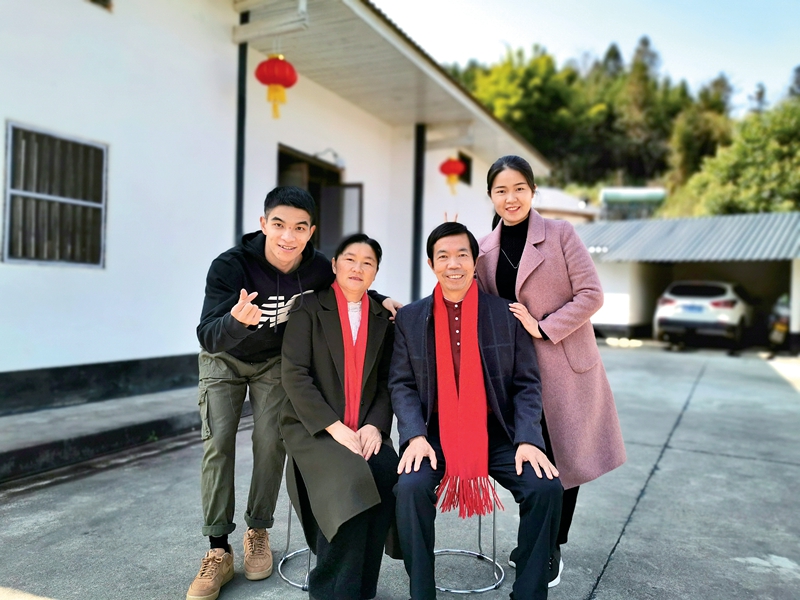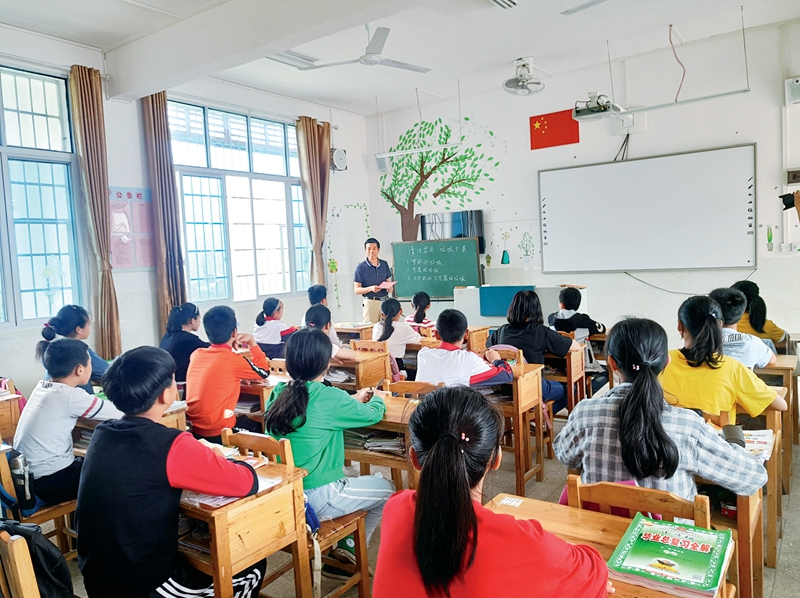Live a Green Life: Make Your Home More Beautiful
Song Wei's Family Helps Protect Xiang River
 |
| Song Wei (R) and his family |
A group of people in Xiangtan, in Hunan Province, has long been dedicated to protecting the Xiang River, which runs through the city. These people are called the "Protectors of Xiang River."
Night Watcher at Zhubu Port
Song Wei, who grew up near the city's Zhubu Port, is an important member of the group.
He has long had deep feelings about the river. "During my childhood, it was a paradise for children. We would go there fishing on weekends, or during holidays," he recalls.
One day, in 2011, when Song and his friends were fishing, they noticed industrial wastewater, which was red and smelly, was pouring into the river, through an underground pipe, from the sewage outlet.
Song was shocked, and he was determined to protect the river. Since an individual's strength is limited, Song joined Xiangtan Environmental Protection Association in 2012. That was the beginning of his commitment to environmental protection.
In 2013, to collect evidence of illegal wastewater discharge by several enterprises, Song stayed at the sewage outlet for 15 consecutive nights, so he could test the water quality. He reported the test results, and his conclusions, to the local government's environmental-protection department.
On the 16th night, the department conducted a surprise inspection at Zhubu Port, and shut down four companies for illegally discharging wastewater.
Song was referred to as the "Night Watcher at Zhubu Port" by the locals.
Twenty-eight chemical enterprises at the port had been closed by September 30, 2014. After that, Song began supervising the remediation of environmental problems caused by straw burning and exhaust emissions.
He often says, "An environmental-protection volunteer should insist on fighting against pollution with courage. Although I feel wronged sometimes, I will never give up."
Over the years, Song has also been active on social-media platforms, including Tik Tok, Weibo and WeChat, where he has revealed results of his investigations into environmental problems.
Protectors of Xiang River were honored as the Legal Figure of the Year in 2013 by the CCTV (China Central Television) for their achievements in protecting the river. Song accepted the award on behalf of the group. Song was honored as the 2017 Annual Figure of Xiang River Protectors by the local government.
 |
| Song Wei and his wife |
Wedding Photos Near Sewage Outlet
Song married Liu Yuan in 2013. Song had a bold idea — to take their wedding photos near the sewage outlet.
Liu agreed with her husband. "To help raise people's awareness of environmental protection, it was quite meaningful for us to do so," she says.
In the wedding photos, the couple stood in stark contrast to the wastewater behind them. Later, the photos were posted online, and the couple received sincere blessings from netizens, many of whom praised the couple for their creativity and perseverance in environmental protection.
"The river has witnessed our love, and we have also witnessed the transformation of this place," Song says.
Song says he couldn't have accomplished so much without the support of his eco-friendly family. "I hope the green lifestyle will take root in everyone's heart, and our small family can influence more families," he says.
Under his influence, his family members have developed many good habits. For example, they don't set off fireworks and firecrackers during festivals or holidays, they don't burn straw or garbage, they conserve water and they turn off lights when they leave a room.
Seven years have passed since Song and Liu posed for their wedding photos near the sewage outlet. With support of and assistance from local government departments, the wastewater flowing into the river has been cleaned. There are also water plants in the river.
Song has become a full-time environmental-protection worker with Xiangtan Ecological Protection Committee. "The work mechanism is more professional than before. We feel pleased that the water quality is getting better, and the air is getting refresher," Song says.
Liu is now a full-time mother to their two children. As a member of the Xiangtan Environmental Protection Association, she often takes her children to participate in the association's activities.
She also teaches her children common sense environmental-protection measures, such as conserving water and electricity. "We hope to plant eco-friendly seeds in our children's hearts," she says.
In May last year, Song's family was honored as one of the National Most Beautiful Families by the ACWF.
Deng Xiaohong's Family Promotes Garbage Sorting for Purer Environment
 |
| The family of Deng Xiaohong (2nd, L) |
"Environmental protection starts with me" is a motto of Deng Xiaohong's family. Deng's family lives in Yi'an, a village in Chongyi County, in Jiangxi Province.
Deng and her husband, Wang Xiangyou, are everyday rural orchardists who in 2003 advanced the concept of "creating a green home by garbage classification." Since then, Deng and her family have promoted garbage classification in the village.
The couple has not only established a clean and eco-friendly home, but they have advocated the green lifestyle in both the village and the town.
Two Bags, Two Barrels
Wang recalls from his childhood how the village had beautiful scenery, and how the residents lived simple lives. However, as living standards improved in the rural areas, the amount of household garbage increased, and some villagers developed the bad habit of littering.
In 2003, eager to improve the environment of the village, the couple decided to implement garbage classification. They developed a simple and feasible way of sorting garbage — using two bags and two barrels.
One bag was used to store metal scraps, plastic bottles and wastepaper — things that could be recycled. The other bag was used to collect hazardous waste, such as batteries, pesticide bottles and light bulbs, which were then thrown into a bin for hazardous trash.
One barrel was used to hold perishable garbage, including fruit peels, vegetable roots and leaves, which would be poured into a biogas digester — a large tank in which biogas is produced through the decomposition of organic matter through a process called anaerobic digestion — or buried under the soil of the orchard as fertilizer.
The other barrel was used to collect plastic bags, tissues, milk boxes and other garbage that could neither be recycled nor used as fertilizer. This garbage was thrown into public trash bins.
In this way, some of the garbage could be recycled, and some could be turned into organic fertilizer. This made it possible to reduce by 70 percent the amount of garbage that ended up in the landfill.
Eight years ago, the village did not have any public trash bins. Deng and Wang would transport their garbage to the waste transfer station (10 kilometers from their home) by motorcycle.
Many of the villagers often asked them, "Why so serious?" They replied, "Littering has seriously affected our lives. If we don't take it seriously, it will not only hurt ourselves, but also future generations. Since we thought of it, why shouldn't we start with our own efforts?"
To get other villagers involved, Deng and Wang compiled a garbage-classification proposal, and they distributed it to all households in the village. They also gave lectures in the county to share their garbage-classification experiences. They also used WeChat groups to promote and share good garbage sorting practices.
With the county- and town-level governments' support, and with villager's efforts, the village became tidy and clean again.
An increasing number of people have come to the village to invest in agricultural development and rural tourism in recent years. The village's economy has developed quickly.
 |
| Wang Xiangyou gives a lecture to share their garbage-classification experiences. |
Living a Decent Life
At Deng's home, rotting garbage is buried under the orchard as fertilizer. The biodegradable toilet is connected to the biogas digester, and all the waste flows into the biogas digester, to be converted into biogas (which can be used for cooking and generating electricity) and biogas liquid (a high-quality organic fertilizer).
To avoid excessive construction waste, the family still lives in an old, adobe house. Although the house is old and plain, it is always nice and neat.
When she talks about building a clean and beautiful home, Deng says, "The yard needs to be taken care of frequently, and the rooms should be cleaned regularly. Captive breeding is also essential for keeping the property clean. Moreover, planting trees and flowers around the house helps improve the environment and air quality."
Deng's children are good garbage-classification assistants. When she sees someone dispose of unsorted garbage, Deng's daughter will write a reminder and post it on the trash bin. She once left the following note on the bin, "Dear everyone, we should not increase the workload of the cleaners. Please sort the garbage first. Use some garbage as fertilizer, or sell those that can be recycled. Decreasing the amount of garbage is a way of protecting the environment. Thanks for your cooperation."
Every time Deng and Wang's children receive packages from online shopping sites, they tear off the tape, throw it into a non-recyclable trash bin, and then collect the cardboard for recycling.
Placing shopping receipts in a recycling bag, using handkerchiefs instead of tissues, and not using disposable chopsticks are among the good habits of Deng's family.
The family never stops promoting garbage sorting. Since graduating from their universities, Deng's children have worked as teachers in Shenzhen and Guangzhou, both in South China's Guangdong Province. They continue to promote environmental protection during their spare time.
The members of Deng's family are warm-hearted, dedicated and cultured. They work hard to ensure a more decent life, which they believe is being able to breathe fresh air, drink clean water, eat green foods and live in a clean, beautiful environment.
Photos Supplied by Wang Xiangyou, Song Wei, Honggerchaoge and Fan Wenjun
(Source: Women of China English Monthly May 2020 issue)
Please understand that womenofchina.cn,a non-profit, information-communication website, cannot reach every writer before using articles and images. For copyright issues, please contact us by emailing: website@womenofchina.cn. The articles published and opinions expressed on this website represent the opinions of writers and are not necessarily shared by womenofchina.cn.






.jpg)

 WeChat
WeChat Weibo
Weibo 京公网安备 11010102004314号
京公网安备 11010102004314号